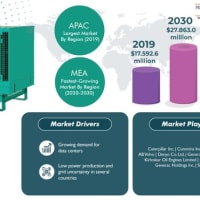
Wind Tower Market Valued at $26,140.5 million in 2015, the global wind tower market is predicted to advance at a 7.4% CAGR during the forecast period (2017–2022). The market is growing due to the rising need for energy independence and geopolitical energy security, increasing government support for wind projects and stringent environmental regulations, and surging wind power capacity around the world. The structure which supports the wind turbine and its components is referred to as a wind tower. In terms of application, the market is bifurcated into offshore and onshore.
When tower type is taken into consideration, the wind tower market is categorized into concrete towers, lattice towers, tubular steel towers, guyed pole towers, and hybrid towers. Out of these, the tubular steel towers dominated the market during the historical period (2012–2015) and are expected to account for the major share of the market during the forecast period as well. This is because tubular steel towers provide strength to the wind turbines are cost efficient. The hybrid towers are predicted to grow at the fastest pace during the forecast period.
Get a sample copy of the market analysis report visit: http://bit.ly/352aRj5
Among all the regions, namely Asia-Pacific (APAC), Middle East and Africa (MEA), Latin America (LATAM), North America, and Europe, the APAC region held the largest share of the wind tower market during the historical period and is further projected to dominate the market during the forecast period. this is due to the rising need for geopolitical energy security and high rate of fossil fuel depletion. China accounted for the major share of the market during the forecast period. The MEA region is expected to register the fastest growth during the forecast period.
The surging depletion of fossil fuels is a key driving factor of the wind tower market. Globally, energy requirements are primarily fulfilled by fossil fuels, such as petroleum, natural gas, and coal. However, due to continuous exploitation, these resources are now getting depleted rapidly. In addition to this, the increased usage of fossil fuels has resulted in a steady rise in the pollution levels around the world. Hence, in order to reduce emission of harmful gases, consumers are now turning toward alternate sources for energy generation, including wind energy, which is driving the market.
The rising wind power capacity around the globe is another major driving factor of the wind tower market. Unlike energy that is generated from fossil fuels, wind energy is a clean and renewable source of energy. Because of this, a considerable rise has been witnessed in the adoption of wind energy over the years. The cumulative installed wind capacity across the globe rose from 47.6 GW in 2004 to 369.Howevern 2014, and is further projected to witness similar growth in the coming years as well.
The growing need for energy independence & geopolitical energy security is also among the primary driving factors of the wind tower market. The production of alternative fuels in one’s own country is referred to as energy independence, which provides the consumers with an opportunity to choose among non-petroleum fuels for transportation. Energy independence is a long-term vision of various countries, such as Mexico, the U.S., Canada, and Brazil. These countries are particularly focusing on freeing themselves from dependence on other countries for oil.
Hence, the market is growing due to the increasing depletion of fossil fuels, surging wind power capacity, and rising need for energy independence & geopolitical energy security.
When tower type is taken into consideration, the wind tower market is categorized into concrete towers, lattice towers, tubular steel towers, guyed pole towers, and hybrid towers. Out of these, the tubular steel towers dominated the market during the historical period (2012–2015) and are expected to account for the major share of the market during the forecast period as well. This is because tubular steel towers provide strength to the wind turbines are cost efficient. The hybrid towers are predicted to grow at the fastest pace during the forecast period.
Get a sample copy of the market analysis report visit: http://bit.ly/352aRj5
Among all the regions, namely Asia-Pacific (APAC), Middle East and Africa (MEA), Latin America (LATAM), North America, and Europe, the APAC region held the largest share of the wind tower market during the historical period and is further projected to dominate the market during the forecast period. this is due to the rising need for geopolitical energy security and high rate of fossil fuel depletion. China accounted for the major share of the market during the forecast period. The MEA region is expected to register the fastest growth during the forecast period.
The surging depletion of fossil fuels is a key driving factor of the wind tower market. Globally, energy requirements are primarily fulfilled by fossil fuels, such as petroleum, natural gas, and coal. However, due to continuous exploitation, these resources are now getting depleted rapidly. In addition to this, the increased usage of fossil fuels has resulted in a steady rise in the pollution levels around the world. Hence, in order to reduce emission of harmful gases, consumers are now turning toward alternate sources for energy generation, including wind energy, which is driving the market.
The rising wind power capacity around the globe is another major driving factor of the wind tower market. Unlike energy that is generated from fossil fuels, wind energy is a clean and renewable source of energy. Because of this, a considerable rise has been witnessed in the adoption of wind energy over the years. The cumulative installed wind capacity across the globe rose from 47.6 GW in 2004 to 369.Howevern 2014, and is further projected to witness similar growth in the coming years as well.
The growing need for energy independence & geopolitical energy security is also among the primary driving factors of the wind tower market. The production of alternative fuels in one’s own country is referred to as energy independence, which provides the consumers with an opportunity to choose among non-petroleum fuels for transportation. Energy independence is a long-term vision of various countries, such as Mexico, the U.S., Canada, and Brazil. These countries are particularly focusing on freeing themselves from dependence on other countries for oil.
Hence, the market is growing due to the increasing depletion of fossil fuels, surging wind power capacity, and rising need for energy independence & geopolitical energy security.




















※コメント投稿者のブログIDはブログ作成者のみに通知されます